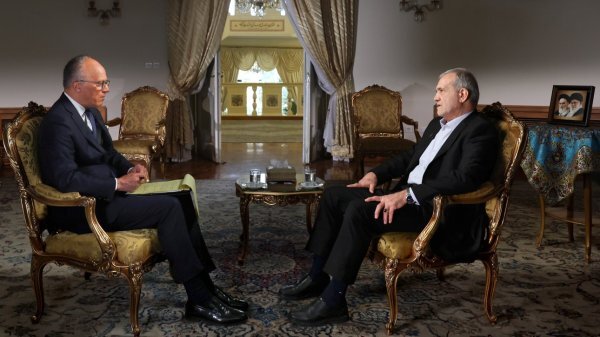Iran will respond to any aggression, Pezeshkian tells NBC, ‘We do not fear war'

TEHRAN – NBC has aired an extended version of the interview it conducted with Iranian President Masoud Pezehskian, in which he said Iran plays no games when it comes to its security, and that his administration would be willing to engage with incoming U.S. President Donald Trump if he approaches Tehran with respect.
In the first few minutes, the interviewer raised the return of Donald Trump to the White House, along with the ensuing debate on whether or not Iran would engage with his second administration.
In his conversation with NBC, Masoud Pezeshkian was unequivocal when responding to a direct question from the host: “Iran, based on principles, is ready to engage with a second Trump administration.”
It is important to note that both the current Iranian government and other authorities within the Islamic Republic have never ruled out diplomatic dialogue with the West, as long as it takes place without external pressures and respects Iran’s red lines regarding both domestic and foreign policy.
The president also took the opportunity to remind the audience of the previous unfulfilled commitments by the United States, as well as Washington’s attempts to overthrow the government in Tehran. Beyond expressing Iran’s willingness to negotiate from a position of equality, Pezeshkian sent a clear message to the U.S. administration: abandon the "regime change" policy and engage in dialogue from a place of mutual respect, not from a stance of imposition.
Pezeshkian emphasized that negotiations should take place within a clear framework, one that involves honoring the commitments made and mutual respect and that there must be a shared will from both parties. “Our problem does not lie in dialogue. The problem is with the commitments derived from negotiations, which must be respected. When Iran negotiated with the major powers on its nuclear program, we fulfilled all the commitments we had made. Unfortunately, it was the other party that did not honor its promises,” he stated. In this regard, he expressed his concerns: “We have doubts that, even if we engage in negotiations, they are actually seeking to overthrow the Iranian government instead of resolving the issues.”
Part of Iran’s problem with the West, and especially with the United States, lies in the lack of commitment previously mentioned. In this context, the rupture of the nuclear agreement (JCPOA), signed in 2015 and ratified by Iran, the United States, the United Kingdom, France, Russia, China, and the European Union, is viewed by Tehran as evidence of the lack of honesty and commitment from the West in its negotiations with the Islamic Republic. The unilateral withdrawal from the agreement by Washington, as has been noted, reinforces this perception.
Despite previous experiences, Pezeshkian’s government committed during its electoral campaign to attempt negotiating a new nuclear agreement with the West, with the main objective of lifting the economic sanctions that are straddling the country.
Regarding sanctions, it is expected that the Trump administration will resume its “maximum pressure” strategy against Tehran, an approach that would further complicate any attempt to reach a diplomatic agreement.
On the possibility of a military escalation in the region, the Iranian president emphasized that Iran does not intend to be a threat. When asked about a potential attack on its nuclear facilities, Pezeshkian was firm: “Iran does not seek war, but in the event of an attack on our nuclear facilities, we are prepared to defend ourselves. Naturally, we will respond to any action against us.”
“We do not fear war,” the president stated, “but we do not seek it. I sincerely hope this does not happen, as it would be harmful to all parties, not just to us.” This desire to avoid a widespread conflict is based on the policy of "good neighborliness," which promotes normal and peaceful relations among nations sharing the same regional space. This strategy was first implemented during the tenure of the late President Ebrahim Raisi.
Regarding the situation in the region, the president pointed out that it is Israel’s policies that are "flooding the region with death and destruction."
Another key issue in the interview arose when Lester Holt, NBC’s host, asked Pezeshkian if he believed Iran’s position had been weakened after the fall of Al Assad in Syria and what he described as the "weakening of Hezbollah." The president responded that there was no connection between those events and a potential weakening of the Islamic Republic, adding that, from his perspective, the country was “much more united than before.”
Leave a Comment